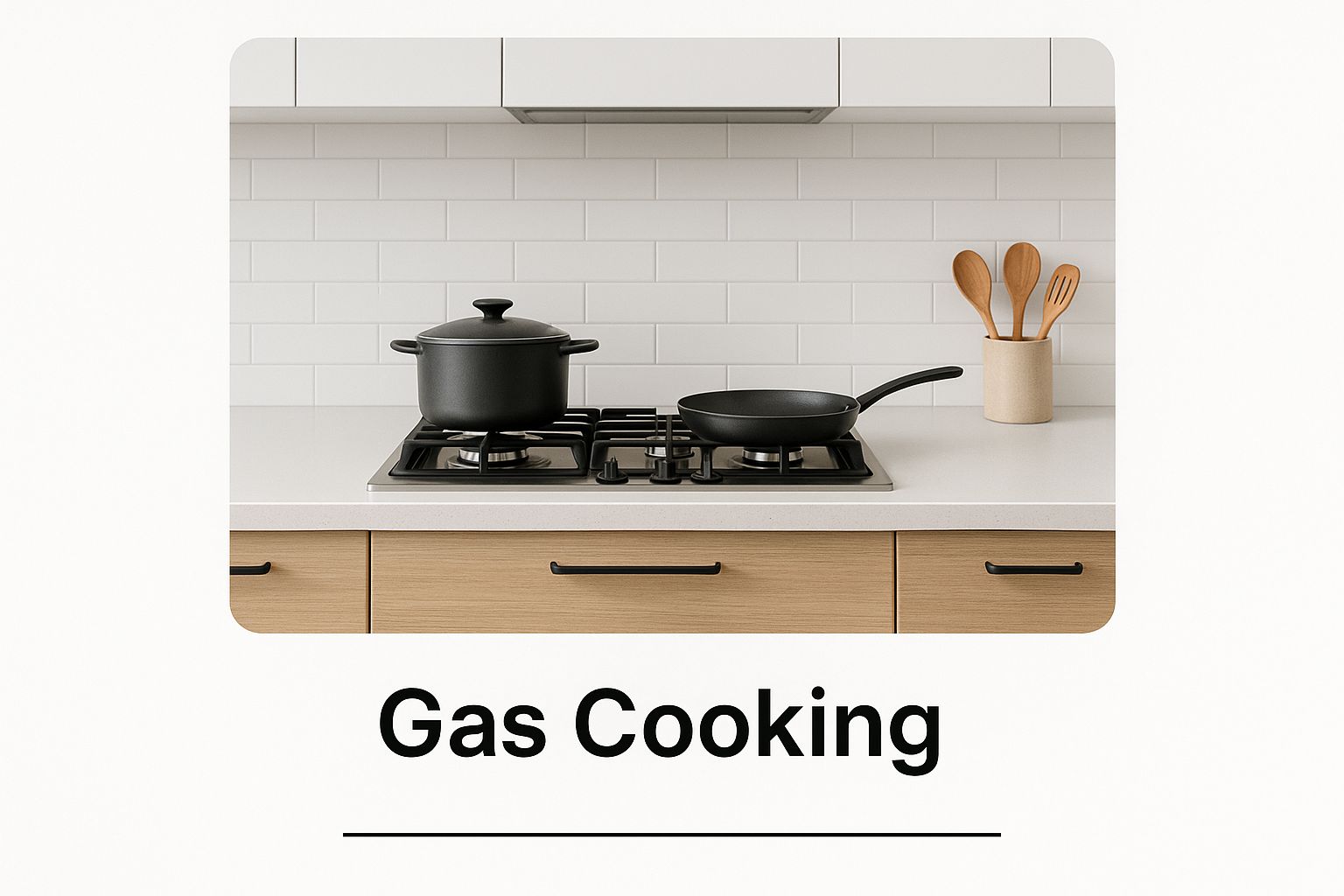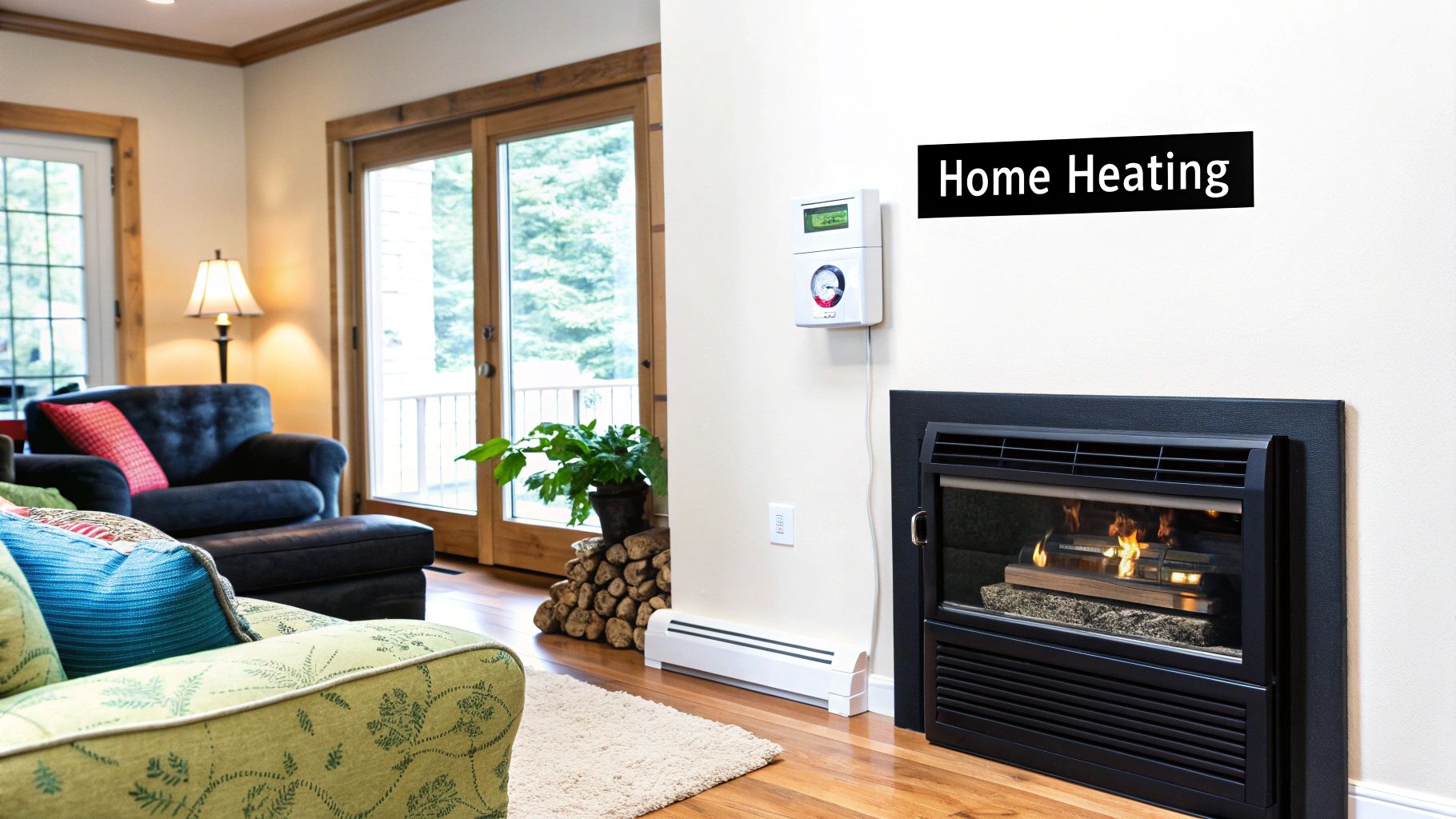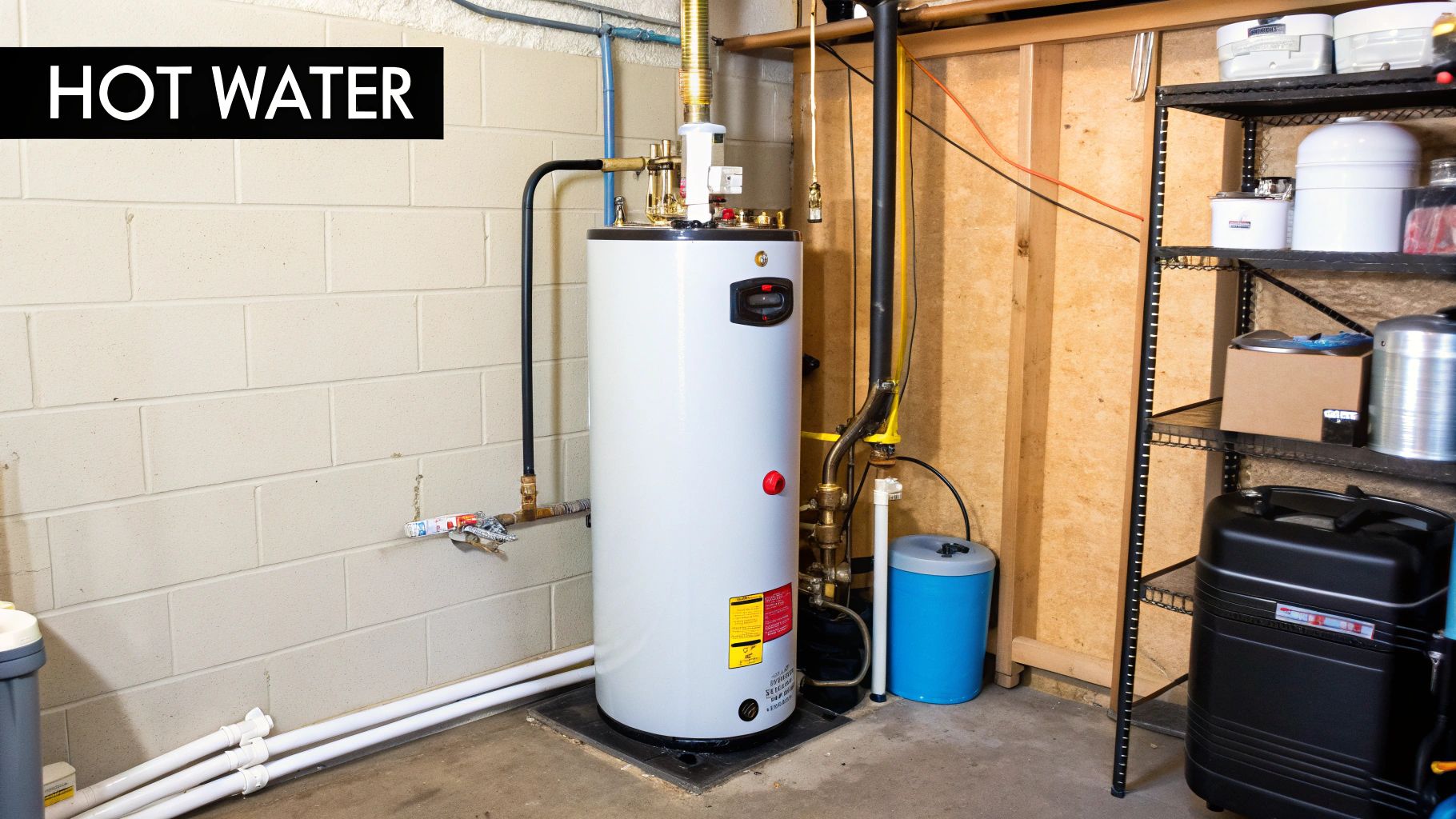What Is Gas Used for in a House? An Essential Guide
- Luke Yeates
- Sep 2
- 10 min read
For most of us here in the UK, natural gas is the unsung hero working behind the scenes. It’s the driving force behind three essential comforts in our homes: keeping us warm, giving us instant hot water, and firing up the hob for a good meal.
The Everyday Role of Gas in Your Home
Think of your home’s gas supply as the engine room for daily living. While electricity powers our lights and gadgets, gas handles the big jobs that need a serious amount of instant heat. For anyone living in Eastbourne, this reliable energy source is what gets us through those chilly coastal winters.
Here at Harrlie Plumbing and Heating, we see just how vital it is every single day. The vast majority of our call-outs in areas like Willingdon or Old Town, whether for a routine boiler service or an emergency repair, are all about keeping that gas system running perfectly. Understanding what gas is used for in your house is the first step to managing it safely and keeping your bills in check.
Let's break down the main jobs gas does in nearly every home.
Common Uses of Gas in a Typical Eastbourne Home
To get a clearer picture, here’s a quick look at where your gas supply is going and why each application is so important for a comfortable home.
Gas Application | Primary Function | Why It's Essential |
|---|---|---|
Central Heating | Powers the boiler to heat water for radiators. | This is what keeps your entire Eastbourne home warm and cosy, especially during colder months. |
Hot Water | Heats water for showers, baths, and taps. | Provides the instant hot water we rely on for washing and cleaning. |
Cooking | Fuels the hob and sometimes the oven. | Offers precise, instant heat control that many home cooks prefer. |
Each of these functions is fundamental to our daily routines, highlighting just how much we depend on a reliable gas supply.
From a warm living room on a damp Eastbourne evening to a hot shower after a long day, gas delivers the fundamental comforts we often take for granted. It's the invisible force that makes a house feel like a home.
How Gas Powers Your Home's Heating and Hot Water
When you think about the jobs gas does around the house, heating and hot water are the big ones. In fact, they’re by far the most important. Your gas boiler is essentially the heart of your home, working away in the background to keep everything comfortable.
It heats water and pumps it through a network of pipes to the radiators in every room—much like a circulatory system delivering warmth. This is what turns a chilly house into a cosy home, especially during a brisk Eastbourne winter. The same boiler also provides instant hot water to your taps, making it the primary workhorse for comfort in most UK homes.

Finding the Right Boiler for Your Home
Not all boilers are created equal, and the best fit usually comes down to your home’s size and your family’s hot water needs. Here in Eastbourne, we at Harrlie Plumbing and Heating mainly work with two popular types:
Combi (Combination) Boilers: These are fantastic all-in-one units that handle both central heating and hot water on demand. Since they don’t need a separate water tank, they’re perfect for smaller homes or flats, like many of the Victorian terraces in Eastbourne, where every inch of space counts.
System Boilers: These work with a separate cylinder to store a large amount of hot water. They’re the ideal choice for larger homes with several bathrooms, like those in the Meads area, as they can supply hot water to multiple taps at once without any frustrating drops in pressure.
No matter the type, modern condensing boilers are now the standard. They are leagues ahead of older models in terms of efficiency because they cleverly capture and reuse heat that would otherwise be lost up the flue. This means less gas is needed to produce the same amount of heat—a win for your wallet and the environment.
Getting a Grip on Your Gas Consumption
All that heavy lifting from your boiler and heating system has a direct impact on your energy bills. In the UK, the average household gets through around 11,500 kWh of gas each year, with almost all of it going towards heating and hot water.
As of 2025, that usage works out to an average monthly gas bill of £69.72. Of course, this can shift depending on how well-insulated your home is and your daily habits. You can get more detailed insights on average UK energy bills to see how your own usage stacks up.
Understanding how your boiler works is the first step toward running it efficiently. An annual service from a professional, like our Gas Safe registered engineers at Harrlie Plumbing and Heating, ensures it operates safely and at peak performance, helping you manage your energy consumption effectively.
The Role of Gas in Your Kitchen

Beyond keeping your home warm, the kitchen is where gas truly comes into its own, offering a level of control that both home cooks and professional chefs swear by. The biggest advantage of a gas hob? Its immediate responsiveness.
Unlike an electric hob that needs time to warm up and cool down, a gas flame delivers instant heat and incredibly precise temperature control. It means you can switch from a roaring, rolling boil for your pasta to a gentle simmer for a delicate sauce in just a few seconds.
This is exactly the kind of control you need to get a perfect, crusty sear on a steak or to gently melt chocolate without any fear of it scorching. It’s this adaptability that makes gas a firm favourite in countless Eastbourne kitchens.
Gas Ovens and Outdoor Cooking
The benefits of gas don't stop at the hob, either. Gas ovens are highly valued for providing a moist heat, which is absolutely brilliant for roasting meats and baking cakes, helping to prevent them from drying out.
Better still, your home’s gas supply can even extend into the garden. A mains-fed gas barbecue does away with the hassle of lugging heavy gas bottles around, providing a constant, reliable fuel source for summer gatherings. It's a convenient option our team at Harrlie Plumbing and Heating has installed for several clients in the Meads and Old Town areas of Eastbourne, and they love it.
"The instant control of a gas flame is indispensable in a busy kitchen. Whether it's for a high-heat stir-fry or a delicate sauce, you have total command over your cooking, which is why it remains the top choice for so many culinary enthusiasts."
Whether you're fitting a new hob or connecting an outdoor grill, safety is non-negotiable. Any gas appliance installation must be carried out by a Gas Safe registered engineer to ensure every connection is secure and the ventilation is spot on. Here at Harrlie Plumbing and Heating, our certified engineers make sure your Eastbourne kitchen is not only high-performing but, most importantly, completely safe.
Exploring Other Common Gas Appliances

While heating and cooking usually get all the attention, your home's gas connection is a lot more versatile than you might think. Beyond the boiler and the hob, several other appliances can run efficiently on gas, adding extra comfort and convenience to your daily routine.
One of the most popular is the gas fireplace. These have become a really sought-after feature in many Eastbourne homes, offering the cosy atmosphere of a real log fire without any of the mess or effort. With just the flick of a switch, you get instant warmth and a beautiful focal point for your living room—no wood chopping or chimney sweeping needed.
Powerful and Practical Alternatives
Gas-powered appliances aren't just about creating a cosy vibe; they can be practical workhorses too. Take gas tumble dryers, for example. Though they're less common than their electric cousins, they come with some compelling benefits:
Faster Drying Times: Gas dryers often heat up more quickly, which can seriously cut down the time it takes to dry a load of laundry.
Lower Running Costs: Because gas is typically cheaper per unit than electricity, these dryers can be much more economical to run over the long term.
These alternative uses show the full potential of what gas is used for in a house, moving it beyond basic utilities and into the realm of lifestyle enhancements.
Whether you're considering a stylish log-effect fire for your home near Sovereign Harbour or a more efficient laundry solution, understanding all your gas options is key. It's about making your home's energy supply work harder for you.
From the initial installation to ongoing safety checks, it's absolutely vital that any gas appliance is fitted by a certified professional. The team at Harrlie Plumbing and Heating are Gas Safe registered and have extensive experience fitting a wide range of gas appliances across Eastbourne, ensuring they operate safely and efficiently from day one.
Practical Gas Safety and Efficiency Tips
Using gas in your home is incredibly safe, but it all comes down to treating your system with respect and sticking to some essential rules. The single most important rule in the UK is that any work on your gas appliances—from fitting a hob to servicing a boiler—must legally be done by a Gas Safe registered engineer.
An engineer with Gas Safe registration has proven they're competent to work safely on gas systems. Think of it as a driving licence for gas work; it's your only guarantee that the person is qualified. At Harrlie Plumbing and Heating, all our engineers are Gas Safe registered, ensuring every job in Eastbourne meets the highest safety standards. To understand more about this crucial certification, you can check out our guide on how to get a gas safety certificate in the UK.
Staying Safe Around Gas
Knowing how to spot a potential problem is the first line of defence in protecting your home. Keep an eye (and nose) out for these tell-tale signs of a gas leak:
A Sulphur Smell: Natural gas is actually odourless, so a distinct "rotten egg" smell is added specifically to alert you to a leak.
Hissing Sounds: A faint hissing or whistling noise near a gas line or appliance could be the sound of gas escaping.
Dying Plants: If indoor plants near a gas pipe suddenly wilt or die for no obvious reason, it might be a sign of a small, slow leak.
If you suspect a leak, act immediately. Open windows, don't touch any electrical switches, and call the National Gas Emergency Service.
It's also absolutely critical to have audible carbon monoxide alarms fitted near your gas appliances, especially your boiler and any gas fires. This invisible, odourless gas is a silent danger, and a properly placed alarm is your only reliable defence.
Boosting Your Home's Gas Efficiency
Making your home more gas-efficient doesn't just cut your energy bills; it also shrinks your environmental footprint. The savings can really add up. For example, between the 2023/24 and 2024/25 financial years, the average UK domestic gas bill fell by 21%, from £1,020 to £808.
An annual boiler service with Harrlie Plumbing and Heating, bleeding your radiators, and using a smart thermostat are all simple yet powerful ways to make sure you’re not wasting energy or money. It’s all about making your system work smarter, not harder.
The Future of Gas in UK Homes
As the UK pushes towards a greener, more sustainable future, the role natural gas plays in our homes is definitely on the brink of a major change. This shift is all about the national commitment to slash carbon emissions and get serious about climate change, which means the way we heat our properties is set to evolve over the coming years.
For decades, gas has been the undisputed king of home heating, but its environmental impact is now under the microscope. Gas consumption in UK households is a pretty hefty contributor to our national greenhouse gas emissions. In fact, in 2023, emissions from our homes accounted for a staggering 21.7% of the UK's total, mostly from our gas-fired boilers and hot water systems. You can discover more about UK environmental accounts to really grasp the scale of this.
Planning for Tomorrow's Energy
For homeowners here in Eastbourne, this doesn't mean your boiler will be outlawed overnight. Not at all. Instead, the industry is gearing up for a steady, gradual transition to low-carbon alternatives. Two key technologies are really leading the conversation:
Hydrogen-Ready Boilers: These clever systems are designed to run on natural gas just like your current boiler, but they can be easily converted to run on 100% hydrogen when the network is ready.
Electric Heat Pumps: Think of these as a refrigerator working in reverse. They cleverly draw latent heat from the outside air or ground to warm your home with incredible efficiency.
This transition is about smart, long-term planning, not a sudden, drastic replacement. Making future-proof decisions today ensures your home stays comfortable, efficient, and compliant for many years to come.
At Harrlie Plumbing and Heating, we make it our business to stay ahead of these changes so we can offer Eastbourne residents the best possible advice. But while it’s wise to prepare for the future, looking after your current system's safety is still absolutely paramount. Have a look at our [Eastbourne's annual gas safety check guide](https://www.harrlieplumbing.co.uk/post/eastbourne-s-annual-gas-safety-check-guide) for all the essential tips you need.
Your Home Gas Questions Answered
We get a lot of calls from homeowners in Eastbourne who are just trying to get their heads around their gas supply. It's a common topic, so we've put together some quick, practical answers to the questions we hear the most at Harrlie Plumbing and Heating.
Is Gas Really Cheaper Than Electricity for Heating?
For heating your home and hot water, the short answer is yes—gas is almost always cheaper than electricity here in the UK.
It's a bit confusing because electricity is technically 100% efficient right where you use it (like in an electric heater). But the cost per kilowatt-hour (kWh) for gas is much, much lower. When it comes to the heavy lifting of running your central heating, especially during a chilly Eastbourne winter, that price difference makes gas the clear winner for your wallet.
What Exactly is a Gas Safety Certificate?
Think of a Gas Safety Certificate as an MOT for your home's gas appliances. It's an official document confirming that everything—from your boiler to your gas hob—has been inspected by a Gas Safe registered engineer and is safe to use.
For landlords, this isn't just a good idea; it's a legal requirement to have this check done every single year. If you're a landlord in Eastbourne and want to get to grips with your responsibilities, our team at Harrlie Plumbing and Heating can help, and you can learn more by reading our essential guide to Gas Safety Certificates.
Regular safety checks are simply non-negotiable. They are the single most important thing you can do to protect your family or tenants from the dangers of gas leaks and carbon monoxide.
Whether you have a question about a safety check or are thinking about installing a new appliance, you need an expert you can trust.
For reliable, professional service across Eastbourne, get in touch with Harrlie Plumbing and Heating today. https://www.harrlieplumbing.co.uk

Comments